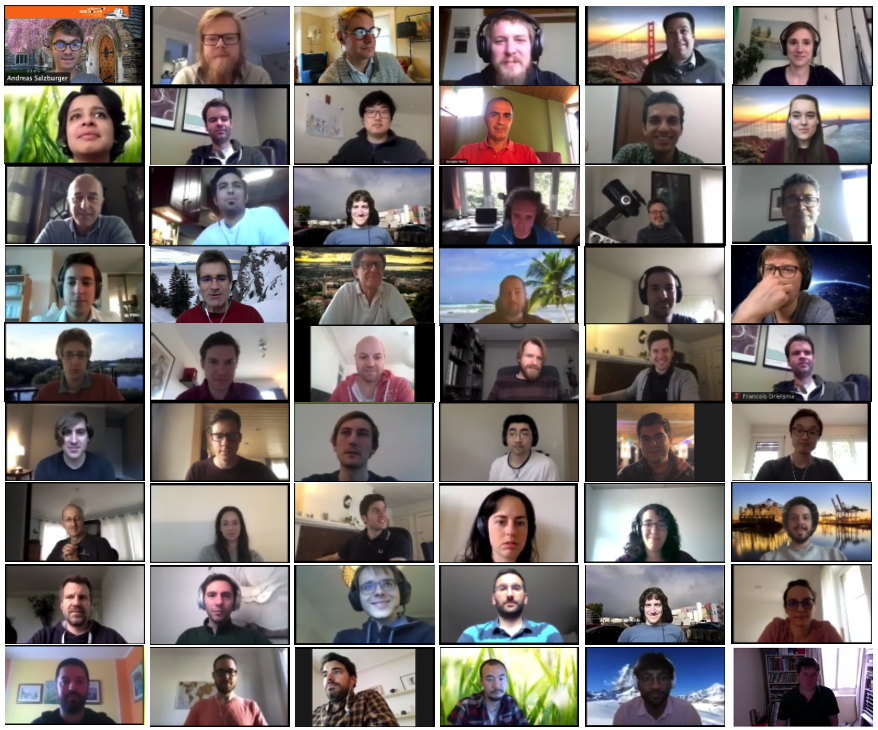CTD2020 went virtual
Our Virtual Group photo
(Updated June 11)
The proceedings deadline is has been extended until June 26, 2020.
(Updated May 2)
Information for submitting proceedings is now available. To help with a timely review process, please submit them by June 12, 2020.
(Updated May 1)
Question/Answer sessions are done. Their recordings are now up on the website (go to timetable, then April 28,29,30, click detailed view, and finally the paperclip to get a link to each one)
(Updated April 27)
Discussion sessions start Tuesday. Check the timetable for those as well as the slides/recordings from last week.
(Updated April 22)
Last day of recording sessions. The first two days worth of excellent talks can be found in the timetable. Today's talks will be up by tomorrow. Watch the Mattermost channel for more information.
(Updated April 18)
ZOOM connection, participant / presenter information, and Mattermost links added.
(Updated April 7)
An initial timetable for recording sessions is now available.
We have opened a new registration form. Please register to get emails about connection information for the workshop (to help us know who has participated and to minimize zoom-bombing or related issues..)
(Updated March 19)
We have decided to organize CTD2020 as to provide sufficient time to discuss everyone's results while not having lengthy video conference meetings. The conference will proceed in 3 stages:
- We will organize “recording sessions” for all talks, which are in timeslots convenient for speakers and mostly out of the "primetime" GVA afternoon / US morning. These will be open for anyone to attend. We plan that these sessions will happen the week of April 20-24 as not to change the original schedule of material preparation for the workshop. Anyone with an oral presentation has the same length of time for their presentation as originally scheduled (either 15 or 25 minutes - check your contribution to confirm). Poster contributions have ten minutes.
- All contribution recordings are made available via the CTD2020 Indico site for viewing by April 24. A platform such as Mattermost will be used to facilitate interactions as recorded presentations are viewed.
- Finally, there will be 3 discussion sessions for Q/A intended to engage contributors and attendees having already watched the full recorded presentations of interest. These are planned for April 28-30 16h-18h GVA time.
More information about scheduling your presentations to follow. If you are not already getting email from us and would like to, please contact the local organizers.
CTD2020 to be virtual
CTD2020
The Connecting The Dots workshop series brings together experts on track reconstruction and other problems involving pattern recognition in sparsely sampled data. While the main focus will be on High Energy Physics (HEP) detectors, the Connecting The Dots workshop is intended to be inclusive across other scientific disciplines wherever similar problems or solutions arise.
Princeton University (Princeton, New Jersey, USA) will host the 2020 edition of Connecting The Dots. It is the 6th in the series after: Berkeley 2015, Vienna 2016, LAL-Orsay 2017, Seattle 2018, and Valencia 2019.
Registration: CTD2020 will be 2.5 days of plenary sessions, starting Wednesday morning April 22, and finishing around lunch time Friday April 24. The workshop is open to everyone. More information available on the Scientific Program and Timetable pages, however the call for abstracts is now closed.
Workshop registration is open (link will take you to our registration page based on Eventbrite). The regular registration fee is 270 USD and 185 USD for students (either graduate or undergraduate student as of January 1, 2020). After March 6, the registration fee will increase by 25 USD (for non-students only). This fee covers local support, morning and afternoon coffee breaks, two lunches, the welcome reception and workshop dinner.
 |
This workshop is partially supported by National Science Foundation grant OAC-1836650 (IRIS-HEP), the Princeton Physics Department and the Princeton Institute for Computational Science and Engineering (PICSciE). |
|
|
|
Follow us @ #CTD2020 |



